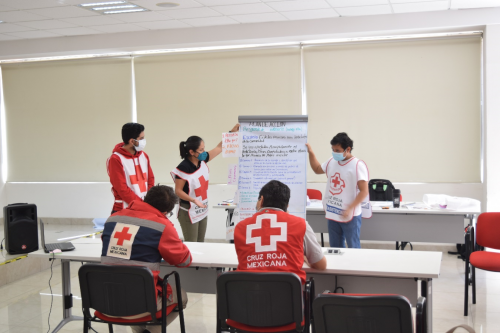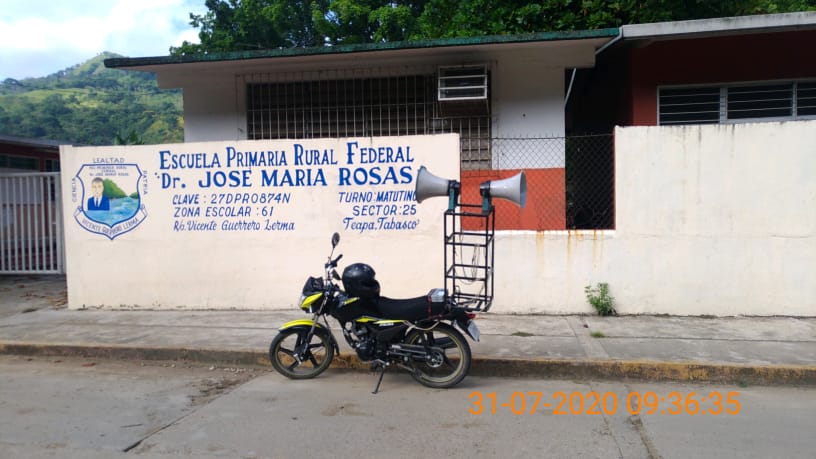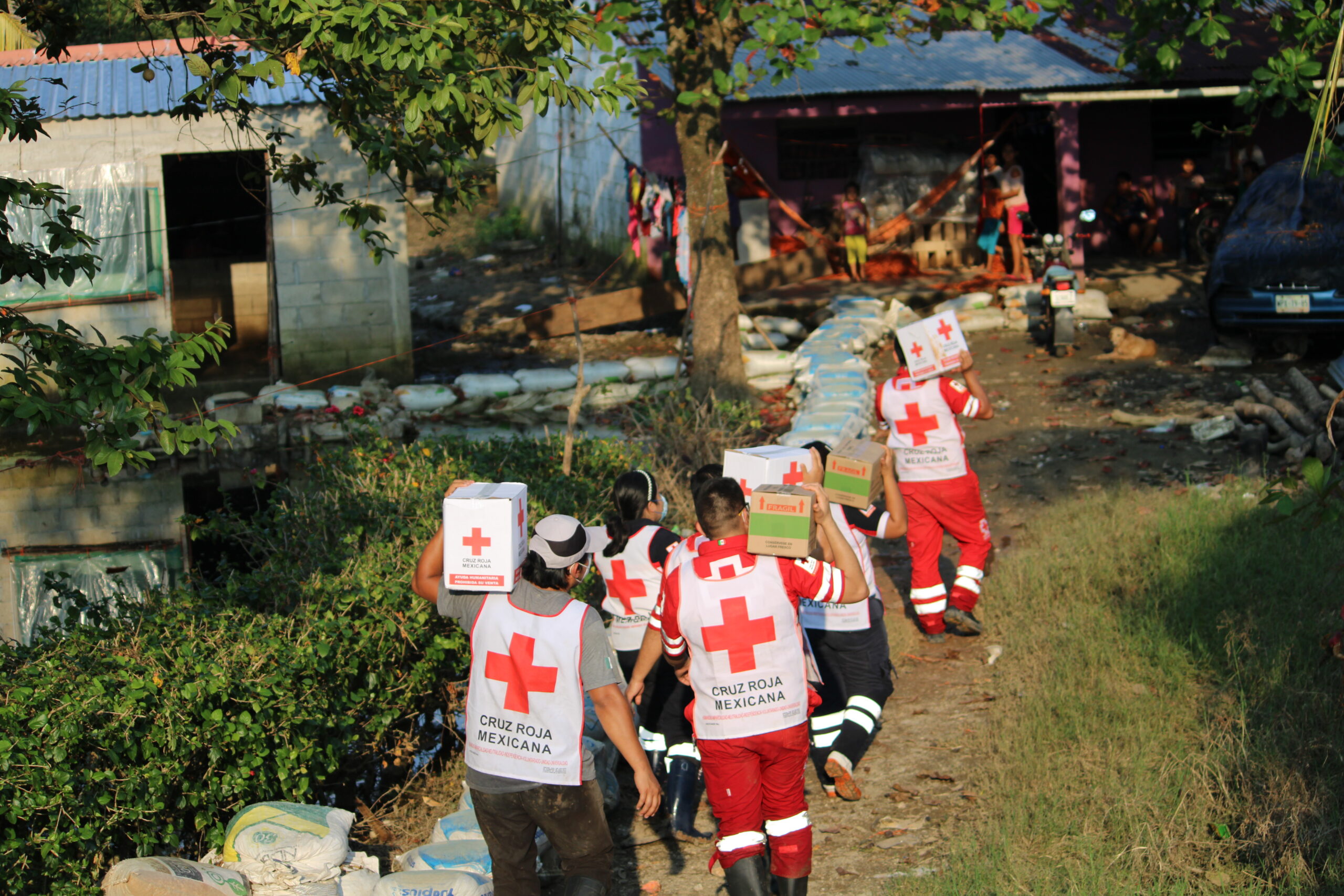Climate change and community flood resilience in Tabasco, Mexico

For the past two years, the Mexican Red Cross and the Red Cross Red Crescent Climate Centre have collaborated closely at the intersection of climate change and community flood resilience in the Mexican state of Tabasco. This blog captures some of the experiences.
Written by Cale Johnstone
Since 2014 the Mexican Red Cross (MRC) has worked to strengthen community resilience together with the International Federation of Red Cross and Red Crescent Societies (IFRC) as part of the Zurich Flood Resilience Alliance.
The Flood Resilience Program in Mexico (PRAIM, for its initials in Spanish) has focused on building capacities and reducing vulnerabilities in more than 20 flood-affected communities in the state of Tabasco. Recent collaboration with the Red Cross Red Crescent Climate Centre has allowed the Program to ensure communities are not only prepared for existing levels of flood risk, but also aware of the increasing risks posed by climate change.
This collaboration did not start with a specific goal to be achieved, rather it evolved naturally over time as a mutually beneficial collaboration.
Brenda Ávila Flores, PRAIM Program Leader
Building a foundation of climate change awareness in communities
During an initial phase of collaboration, the Climate Centre assisted the PRAIM team in accessing climate change information and provided participatory methods for sharing this information within the community, particularly via The Climate Training Kit (CTK) and Youth Adapt (Y-Adapt).
The flexibility of the resources allows the field team, who have extensive experience and understanding of the local context, to adapt the activities to the target communities for a more effective impact.
Guadalupe de Jesús Pérez Camacho, member of the PRAIM team in Tabasco
In early 2020, the MRC team, along with volunteers, visited a local high school in the town of Las Nieves in order to carry out a session of interactive games focused on climate change.
The 14- and 15-year-old students participated enthusiastically in activities focused on the differences between weather and climate and were able to build on some climate change knowledge they had begun to develop in the classroom.

Due to the COVID-19 pandemic schools transitioned to distance learning and many in-person activities were suspended across Red Cross programs nationally. Opportunities for reaching young people were further limited by serious floods during late 2020. Given these challenges the PRAIM pivoted their strategy to lead a workshop for facilitators who were given the skills to later replicate climate change activities in local communities.

Scaling climate scenarios to the local level
Generally, the impacts of global phenomena, such as climate change, are described in global terms however, building community resilience requires a local understanding of the impacts that can be caused by these phenomena. This paradox motivated the team to find a way to bring climate change information closer to the communities in Teapa, Tabasco.
Climate change is normally presented as a global phenomenon with global impacts and people ask themselves ‘how will this affect my community? ‘How will this change my day-to-day life?’
Juan Bazo, Climate Science Adviser and Latin America focal point for the Climate Centre
Global climate change scenarios outline the different paths that climate change may take and the potential environmental and societal impact of each. In Mexico, the National Autonomous University of Mexico (UNAM) generates models that focus the climate change scenarios on the national context. The Mexican Red Cross and the Climate Centre collaborated to create a first-of-a-kind local climate change reference document that further scales climate change scenarios to the community level.
On the basis of analysis of minimum temperature, maximum temperature and average rainfall, this reference document presents possible future climate scenarios that can be used to evaluate possible impacts and take early mitigation or preventative actions. Via community consultations the team coupled technical expertise with local knowledge to achieve a comprehensive perception of risk.
Disasters related to the climate are becoming more frequent around the world and our focus is always on how these events impact people and communities.
Nadia Ortega, Senior Official, Disaster Risk Management, IFRC Regional Office for Latin America
The reference document will be shared with the communities of Teapa and other key community resilience partners in order to facilitate decision-making and ensure that community preparedness activities consider the effects of climate change.
What we’ve learned from collaborating
Collaboration between the Mexican Red Cross and the Climate Centre has provided a path for introducing the topic of climate change to community resilience-building activities.
The Mexican Red Cross has accumulated experience working in the area of community resilience and disaster preparedness, and this collaboration with the Climate Centre has provided us the technical expertise and guidance to incorporate climate change into our activities.
Gabriel Reyes, PRAIM Operational Coordinator

Collaboration is a powerful way of bringing together diverse skills, expertise and ideas and combining efforts to create outcomes with better and broader impacts. This period of close collaboration between the Mexican Red Cross and the Climate Centre has been a constructive and rewarding experience for all.
For more information
Get in touch with Brenda Ávila Flores, Program Leader, bavila@cruzrojamexicana.org.mx or Cale Johnstone, Knowledge Manager, johnstone.cale@gmail.com
This blog was written by Cale Johnstone and originally published on the Flood Resilience Portal of the Zurich Flood Resilience Alliance. Please find the original story here.



